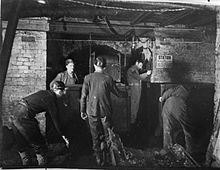This article needs additional citations for verification. (December 2012) |

Bevin Boys were young British men conscripted to work in coal mines between December 1943 and March 1948,[1] to increase the rate of coal production, which had declined through the early years of World War II.[2] The programme was named after Ernest Bevin, the Labour Party politician who was Minister of Labour and National Service in the wartime coalition government.[3]
Chosen by lot as 10% of all male conscripts aged 18–25 (plus some volunteering as an alternative to military conscription) nearly 48,000 Bevin Boys performed vital and dangerous civil conscription service in coal mines. Although the last ballot took place in May 1945 (shortly before VE Day), the final conscripts were not released from service until March 1948. Few chose to remain working in the mining industry after demobilisation; most left for further education or for employment in other sectors.[4]
Bevin Boys were targets of abuse from the general public, who mistakenly believed them to be draft dodgers or cowards. They were frequently stopped by the police as possible deserters.[4] Unlike those who had served in the military, Bevin Boys were not awarded medals for their contribution to the war effort and official recognition by the British government was only conferred in 1995.[4]
- ^ Bevin Boys – BERR Archived 14 July 2009 at the Wayback Machine
- ^ "Historical coal data: coal production, availability and consumption". UK Government. 25 January 2019. Archived from the original on 23 April 2018. Retrieved 23 April 2020.
- ^ "Bevin, Ernest". Oxford Dictionary of National Biography (online ed.). Oxford University Press. doi:10.1093/ref:odnb/31872. (Subscription or UK public library membership required.)
- ^ a b c "Remembering the Bevin Boys in the Second World War". National Museum Wales. 3 January 2008. Archived from the original on 21 September 2020. Retrieved 24 April 2020.